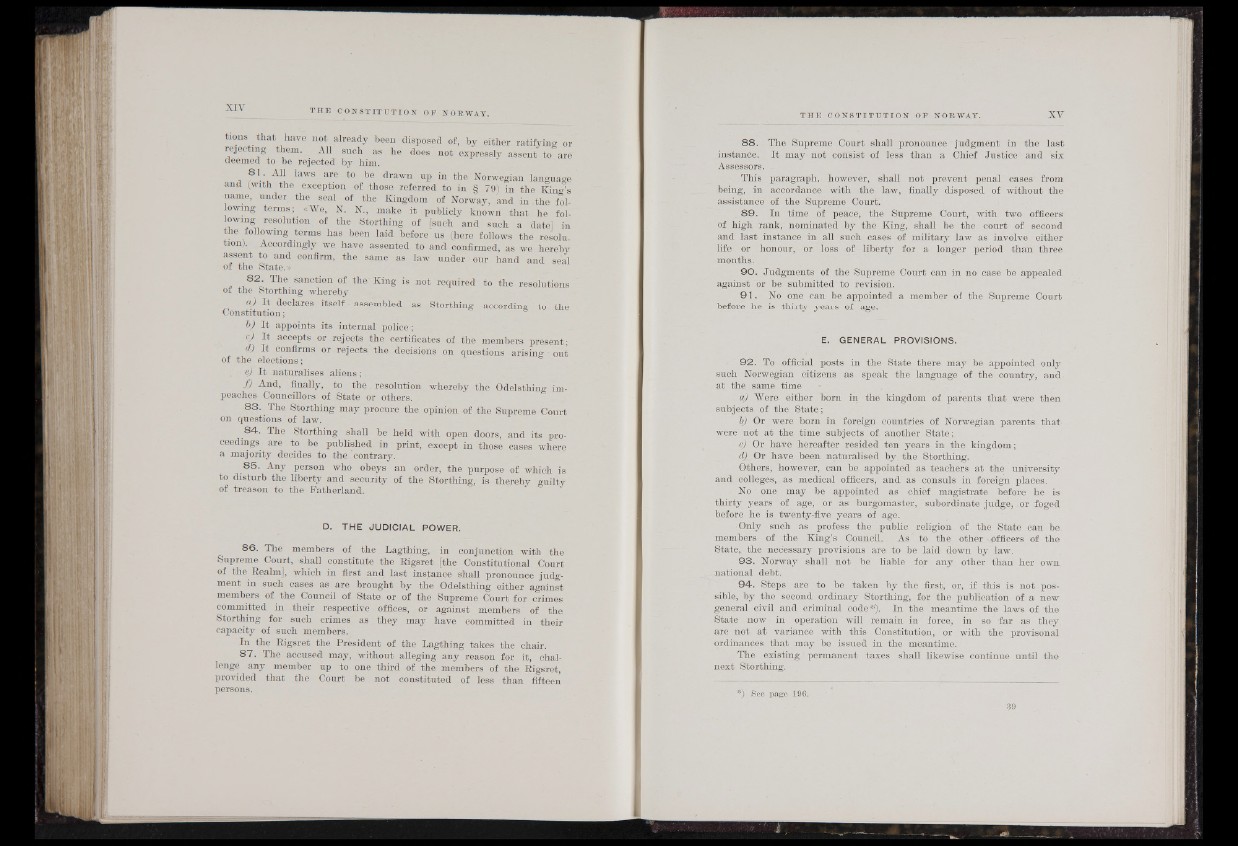
tions that have not already been disposed of, by either ratifying or
rejecting them. All such as he does not expressly assent to are
deemed to be rej'ected by him.
, 8 [■ A1J laws are to be drawn up in the Norwegian language
and (with the exception of those referred to in § 79) in the King’s
name, under the seal of the Kingdom of Norway, and in the following
terms; «'We, N. N., make it publicly known that he following
resolution of the Storthing of [such and such a date! in
the following terms has been laid before us (here follows the resolu
tion). Accordingly we have assented to and confirmed, as we hereby
assent to and confirm, the same-as law under our hand and seal
of the State.»
, 82 ■ The sanction of the King is not required to the resolutions
of the Storthing whereby
a) It declares itself ■ assembled as Storthing according to the
Constitution j
b) It appoints its internal police;
c) It accepts or rejects the certificates of the members present;
a) It confirms or rejects the decisions on questions arising out
of the elections;
e) It naturalises aliens;,
f ) And, finally, to th e. resolution whereby the Odelsthing impeaches
Councillors of State or others.
83. The Storthing may procure the opinion of the Supreme Court
on questions of law.
84. The Storthing shall be held with open doors, and its proceedings
are to be published in print, except in those cases where
a majority decides to the contrary.
85. Any person who obeys an order, the purpose of which is
to disturb the liberty and security of the Storthing, is thereby guilty
of treason to the Fatherland.
D. THE JUDICIAL POWER.
8 6 . The members of the Lagthing, in conjunction with the
Supreme Court, shall constitute the Rigsret [the Constitutional Court
of the Realm], which in first and last instance shall pronounce judgment
in such cases as are brought by the Odelsthing either against
members of the Council of State or of the Supreme Court for crimes
committed in their respective offices, or against members of the
Storthing for such crimes as they may have committed in their
capacity of such members.
In the Rigsret the President of the Lagthing takes the chair.
87. The accused may, without alleging any reason for it, challenge
any member up to one third of the“ members of the Rigsret,
provided that the Court be not constituted of less than fifteen
persons.
88. The Supreme Court shall pronounce judgment in the last
instance. It may not consist of less than a Chief Justice and six
Assessors.
This paragraph, however, shall not prevent penal cases from
being, in accordance with the law, finally disposed of without the
assistance of the Supreme Court.
89. In time of peace, the Supreme Court, with two officers
of high rank, nominated by the King, shall be the court of second
and last instance in all such cases of military law as involve either
life or honour, or loss of liberty for a longer period than three
months.
90. Judgments of the Supreme Court can in no case be appealed
against or be submitted to revision.
91. No one can be appointed a member of the Supreme Court
before he is thirty years of age.
E. GENERAL PROVISIONS.
92. To official posts in the State there may be appointed only
such Norwegian citizens as speak the language of the country, and
at the same time
a) "Were either bom in the kingdom of parents that were then
subjects of the State;
bj Or were born in foreign countries of Norwegian parents thatwere
not at the time subjects of another State;
c) Or have hereafter resided ten years in the kingdom;
d)i Or have been naturalised by, the Storthing.
Others, however, can be appointed as teachers at the university
and colleges, as medical officers, and as consuls in foreign places.
No one may be appointed as chief magistrate before he is
thirty years of age, or as burgomaster, subordinate judge, or foged
before he is twenty-five years of age.
Only such as profess the public religion of the State can be
members of the King’s Council. As' to the other --officers of the
State, the necessary provisions are to be laid down by law.
93. Norway shall not be liable for any other than her own
national debt.
94. Steps are to be taken by the first, or, if this is not possible,
by the second ordinary Storthing, for the publication of a new
general eivil and criminal code*). In the meantime the laws of the
State now in operation' will remain in force, in so far as they,
are not at variance with this Constitution', or with the provisonal
ordinances that may be issued in the meantime.
The existing permanent taxes shall likewise continue until the
next Storthing.